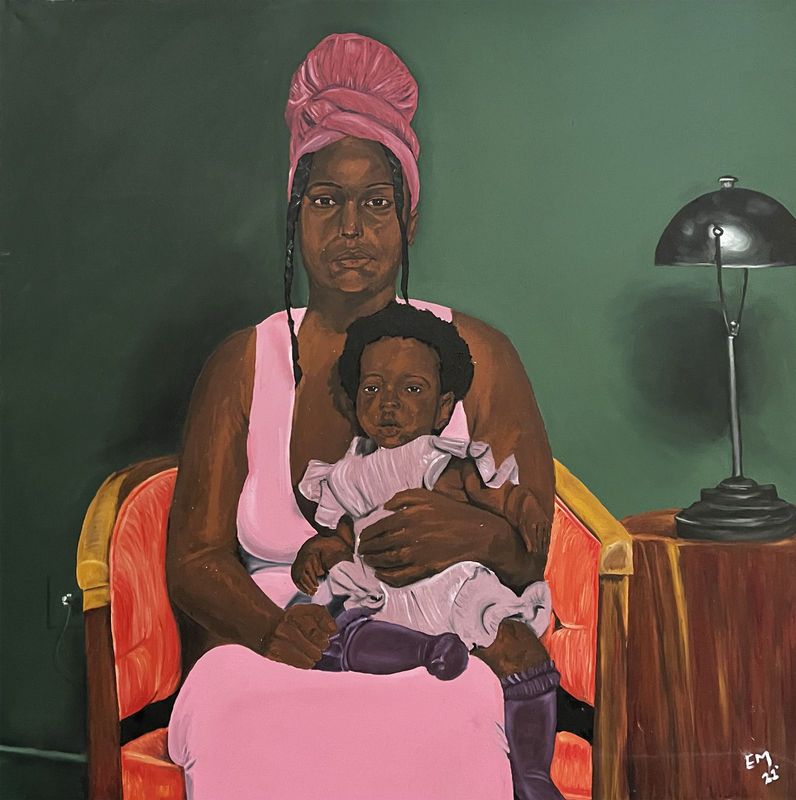With Egbé Okpá, Matthew Eguavoen proposes a personal and intimate body of work, taking the viewer into the heart of his emotions, in the footsteps of his own experience. As always in the artist's paintings, fashion takes centre stage, presenting sculptural figures in a setting with a perfectly mastered aesthetic. [...] Under his brushes, art, fashion and social issues merge, reflecting his generation.
Matthew Eguavoen's portraits stage his thoughts on Nigerian society. He explores social, economic and political issues through the eyes of his models. His new series of works presented in the exhibition Egbé Okpá plunges visitors into the intimacy of a couple.
Egbé Okpá, which means "one family" in Benin language - a language spoken in the artist's native Edo region of southwestern Nigeria - reflects the autobiographical nature of the work. Matthew Eguavoen's narrative is imbued with the birth of his first child, as he projects in it his experience as a young father. He questions parenthood and the impact of this upheaval on the couple. What was life like before? How does one go from two to three? How are our responsibilities and priorities changed permanently and irreversibly? Egbé Okpá unveils intimate portraits by plunging us into the confidence of family moments.
Matthew Eguavoen perpetuates the tradition of family portraits. Historically, family portraits used to depict historical figures, politicians, members of the aristocracy and the bourgeoisie - from Diego Velazquez's portrait of the Infanta Margarita to Jan Van Eyck's Arnolfini Portrait - showing the individuals in their homes and exposing the ties that bind them. These portraits inscribed the family in history and carried its social and economic success. They saluted its importance by displaying its wealth and stability. In the same vein, the composition of Matthew Eguavoen's portraits is evocative. By immersing his figures in the comfort of a domestic setting, he shows the central position of the child in this new trio. He illustrates with his brushes how the harmony of the couple is changed, how the offspring becomes a new pillar of the family balance. It is now this little girl who points the direction to follow with her finger. She is the one with the angel's wings in the background of a photo frame. She is the one who attracts attention in the foreground. She is the one who now rules the family life.
Matthew Eguavoen's paintings recall the challenges and impact of parenthood - echoing the words of Emanuele Coccia: "To be a mother (or father) means to know how to migrate from body to body, to let this self that has arrived in us from elsewhere migrate towards other destinies and other forms of life.” To be a parent is to decentre oneself, to think of one's child before thinking of oneself. Matthew Eguavoen stages and highlights the different duos that emerge within the family relationship, the complicities that are created, as well as the ties that bind them.
Thus, the gallery of crypto-portraits that Matthew Eguavoen proposes is articulated around the arrival of his child. By reflecting on his feelings about his new fatherhood, he instills the idea that becoming a father has changed his conception of the world and his relationship with his partner. He presents a frank and personal vision of fatherhood. His portraits, with their neutral expressions and piercing looks, leave room for interpretation. Although they are tinged with tenderness, they sometimes bear witness to certain baby blues, where parenthood is accompanied by its share of questioning and doubts. They follow the stages that Matthew Eguavoen himself faced in his journey: from the difficulties he finally overcame, to his pride in being a father. The titles of his works - Behind Every successful Adam; Iyaniwura (Mother is as precious as gold) - reflect the importance of the female figure: companion and mother - as precious as gold.
While the traditional family portrait has been gradually abandoned for photography, democratising it by making it accessible to all - notably through studio photography - Matthew Eguavoen himself draws his inspiration from fashion shots and changes the context. In this way, he creates certain proximity between his models and the public and recalls the moments of sharing and pride captured in the photo studios that spread and made the reputation of African photography.
With Egbé Okpá, Matthew Eguavoen proposes a personal and intimate body of work, taking the viewer into the heart of his emotions, in the footsteps of his own experience. As always in the artist's paintings, fashion takes centre stage, presenting sculptural figures in a setting with a perfectly mastered aesthetic. Thus, Matthew Eguavoen's art, while rooted in a classical portrait tradition, is part of the Black Vanguard, a form of figuration that strongly advocates its origins and culture, influenced by the world of fashion. Under his brushes, art, fashion and social issues merge, reflecting his generation.

